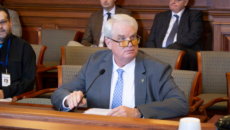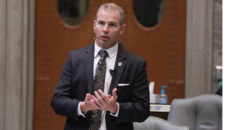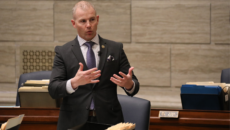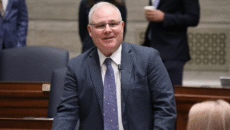JEFFERSON CITY, Mo. — It seems a statewide prescription drug monitoring program (PDMP) has finally found a path forward in the Senate.
After nearly eight hours of debate to start the week, senators appeared to reach somewhat of a compromise, which resulted in HB 1693, carried by GOP Sen. Tony Luetkemeyer in the upper chamber, to be referred to Fiscal Oversight early Tuesday morning.
With members of the Conservative Caucus largely holding court, senators seemed at loggerheads over the House bill that would enact a statewide PDMP. Proponents have argued a more robust, statewide system could help curtail the opioid epidemic; opponents have raised a bevy of privacy concerns.
But just after midnight Tuesday, Luetkemeyer introduced a Senate substitute for the legislation that appeared to be somewhat of a compromise: Instead of the Department of Health and Senior Services (DHSS) overseeing a PDMP, it would be up to a “Joint Oversight Task Force” to handle the program. That task force would be made up of physicians, pharmacists, and others.
“The idea was to move it out from a governmental entity and make it more a private-sector approach where the actual prescribers and dispensers would be in control of the PDMP,” Luetkemeyer said.
The new substitute also included a three-year purge as well as a requirement that the information gathered from a PDMP only be utilized for health care services for a patient.
“No law enforcement may have access to the information contained in the PDMP,” Luetkemeyer said of the substitute.
Creating a comprehensive PDMP — such as this year’s HB 1693 — has been a labor of love for Republican Rep. Holly Rehder, the bill sponsor.
“We truly need this to be a statewide program so that all of our physicians have their patients’ health records at their fingertips,” Rehder told The Missouri Times last month. “With knowing that addiction trends can be spotted early on, we need this as a tool to [fight] this epidemic, to have that knowledge and access so that they can make informed prescriptions.”
A coalition of the Senate’s more conservative members has staunchly decried a statewide PDMP, mostly citing privacy concerns. Following the introduction of the substitute, Sen. Bob Onder praised the idea of a private-sector group overseeing the PDMP as a “big improvement.” Still, he wasn’t willing to pledge his vote for the bill before it was referred to Fiscal Oversight early Tuesday morning.
“Senator Burlison did a great job negotiating on the government database bill. He has spent countless hours researching what other states have done to combat the opioid epidemic,” Sen. Denny Hoskins told The Missouri Times. “Armed with the facts and wanting to protect Missourians’ privacy and Second Amendment rights, he was able to come to a compromise to ensure these two things had further protections in the bill.”
“Addressing Missouri’s opioid crisis should not be a partisan issue, but unfortunately a statewide PDMP has been blocked in the Legislature by a group of Republicans from the Conservative Caucus,” Senate Democratic Leader John Rizzo said in a statement. “Tonight, a bipartisan coalition was able to breach this impasse and give initial passage to the PDMP bill. This legislation would not have passed without Democratic support, and we are proud to stand together to fight Missouri’s opioid epidemic.”
Although Missouri doesn’t have a statewide PDMP, there have been several enacted on the local level, including in St. Louis.
“The PDMP is something that is very, very important for the state of Missouri,” said Democratic Sen. Jamilah Nasheed. “I don’t think there should be a PDMP for Jackson County. I don’t think there should be a PDMP for St. Louis or a PDMP for Mexico. I believe there needs to be a universal PDMP across the board where we all have the same policies. And we can get there in this chamber.”

Kaitlyn Schallhorn was the editor in chief of The Missouri Times from 2020-2022. She joined the newspaper in early 2019 after working as a reporter for Fox News in New York City.
Throughout her career, Kaitlyn has covered political campaigns across the U.S., including the 2016 presidential election, and humanitarian aid efforts in Africa and the Middle East.
She is a native of Missouri who studied journalism at Winthrop University in South Carolina. She is also an alumna of the National Journalism Center in Washington, D.C.
Contact Kaitlyn at kaitlyn@themissouritimes.com.













